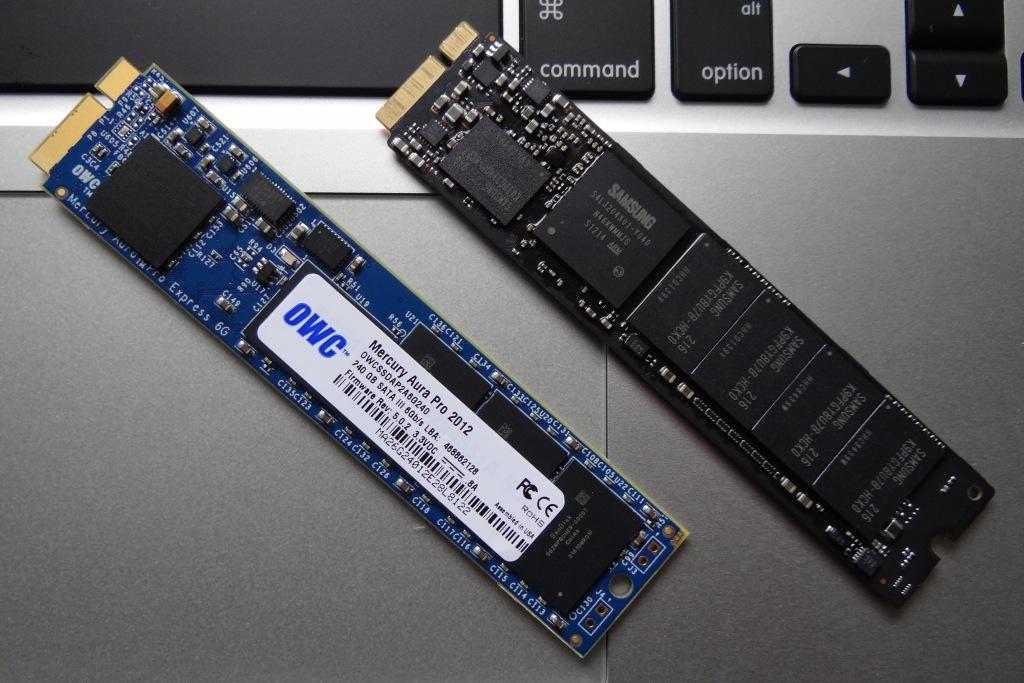STORAGE SHOWDOWN
Our review of the OWC Mercury Aura Pro is going to be conducted through a side by side comparison with the stock Samsung 256GB PM830 SSD. We can attest right off that both drives are of the highest quality and performance, however, there are instances where people will want to upgrade through such things as brand preference and the need for higher capacity.
Our Test Bench for this report is a 13″ MacBook Air (mid-2012) with the 2Ghz Intel Core i7 Ivy Bridge processor and 8GB DDR3-1600 RAM.
BENCHMARK SOFTWARE
The software we will be using for today’s analysis is typical of many of our reviews and consists of ATTO Disk Benchmark, Crystal DiskMark, AS SSD, Anvil Storage Utilities and PCMark Vantage. We rely on these as they each have a way of supporting one another yet, at the same time, adding a new performance benchmark to the total picture. Much of the software is free and can be downloaded simply by clicking on the linked title.
SSD COMPRESSION AND TESTING FLUCTUATIONS
All SSDs are not created equal and many new SSD enthusiasts realize that when they test their new drive to confirm specifications and ensure all is in order. LSI SandForce controlled SSDs, as in the OWC Mercury Aura Pro we are testing today, use compression techniques in storage whereas many others do not.
This creates a bit of confusion when enthusiasts test the drive with random data through benchmarking programs such as AS SSD and Crystal DiskMark. The results seem to be lower than the listed specifications.
ATTO Disk Benchmark is perhaps one of the oldest benchmarks going and is definitely the main staple for manufacturer performance specifications. ATTO uses RAW or compressible data and, for our benchmarks, we use a set length of 256mb and test both the read and write performance of various transfer sizes ranging from 0.5 to 8192kb. Manufacturers prefer this method of testing as it deals with raw (compressible) data rather than random (includes incompressible data) which, although more realistic, results in lower performance results.

 Our first comparison displays our Aura Pro results on the left with Samsung on the right. The Aura Pro displays what we would expect to see from a ‘LSI SandForce Driven’ SSD and the Samsung SSD meets its performance specifications as well. ATTO tests in highly compressible data and this type of data is the sweet spot for all SSDs utilizing LSI Sandforce Flash Storage processors (FSPs).
Our first comparison displays our Aura Pro results on the left with Samsung on the right. The Aura Pro displays what we would expect to see from a ‘LSI SandForce Driven’ SSD and the Samsung SSD meets its performance specifications as well. ATTO tests in highly compressible data and this type of data is the sweet spot for all SSDs utilizing LSI Sandforce Flash Storage processors (FSPs).
 The SSD Review The Worlds Dedicated SSD Education and Review Resource |
The SSD Review The Worlds Dedicated SSD Education and Review Resource | 

“there have been times when I just wanted to introduce them to my 20 oz. straight claw rip hammer” — 20-oz. claw hammer = adjustment tool / 5-lb. sledge hammer = FINE adjustment tool
Those pentalobe screws turned me off big time. Les, I truly hope you have not gone over to the dark side 🙂 I am back with Lenovo with their keyboard that is 3 times better than a flat key keyboard. Looking hard at the upcoming Carbon X1.
Yes th X1 is very attractive. I have to admit that I do find myself using both the MBA and iPAD quite a bit, however, even though the mainstay of my work is on our main benches. Tempted to grab a Thunderbolt Display though….patience…
I use the iPhone and much less often the ipad. But I really do not consider them macs. I love them both. But the flat keys on the mac laptops compared to the beautiful new keyboard on the Lenovo’s is no contest for me. The coming soon Lenovo 430u is also very interesting. I will be selling my current X1 to get one of the new Lenovo’s. And then, of course, slap a nice 240gb SSD in it.
My new Asus Zenbook Prime UX31A-DB51 has 128GB mSATA but I need larger one. Will this OWC fit? The UX31 SSD is also a “blade” type with one screw at the end eg. AnandTech 6/3/2012 teardown of the UX21A (looks like twin of the 31A). Really have a need for the larger mSATA.
The OWC drive is made specifically for Macs. It will not work.
Are you certain? Have you tried this? I have been looking at the pinouts for this drive and it looks exactly the same (18-PINS). “Other” MB AIR drive, like the Toshiba, Samsung, etc. have (20-PINS) the outter (2-PINS) look as is they would prohibit the drive in being used in another NON-MB AIR system, but the OWC Aura PRO doesn’t have these (2) extra PINS (they act like blockers).
Has anyone else tried installing this OWC Aura PRO SSD in an ASUS Zenbook MOBO? Please advise. Can’t find the SanDISK U100 or the ADATA XM11. Need help!
The ONLY thing we can suggest is to follow the manufacturers compatibility listing.
Hi How reliable are these ssd’s? amazon customer reviews were not good … poor quality after repeated replacements…not sure i want to take the risk.
We can only speak for our own experience and have one installed in one of our bench systems without any problem whatsoever.
Hello Mr. What is your experience with durability of OWC SSD? I recently purchased one, but I was reading some other reviews about it and they said it does not last long, what can you tell me about it?
Nice review by the way!